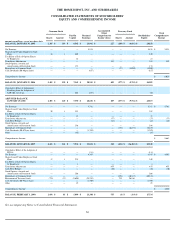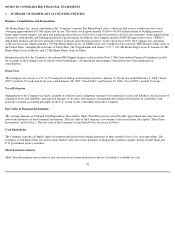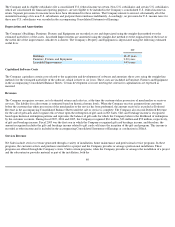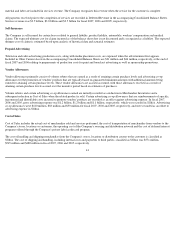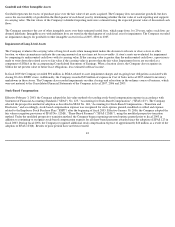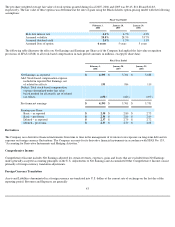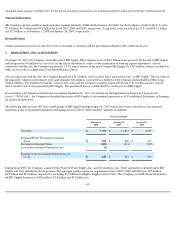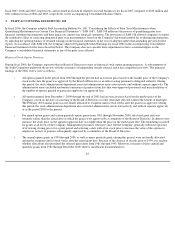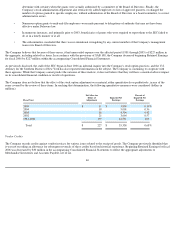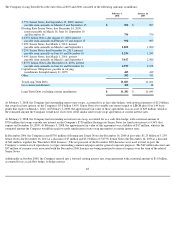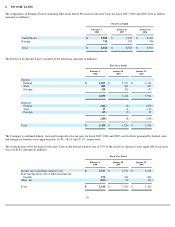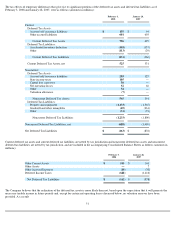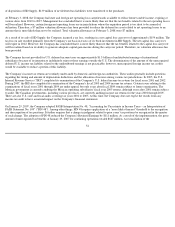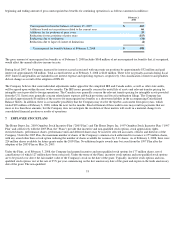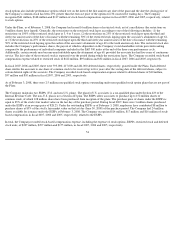Home Depot 2007 Annual Report Download - page 62
Download and view the complete annual report
Please find page 62 of the 2007 Home Depot annual report below. You can navigate through the pages in the report by either clicking on the pages listed below, or by using the keyword search tool below to find specific information within the annual report.
fiscal 2007, 2006 and 2005, respectively, and recorded no Goodwill related to its retail businesses for fiscal 2007 compared to $229 million and
$111 million for fiscal 2006 and 2005, respectively, in the accompanying Consolidated Balance Sheets.
3. STAFF ACCOUNTING BULLETIN NO. 108
In fiscal 2006, the Company adopted Staff Accounting Bulletin No. 108, "Considering the Effects of Prior Year Misstatements when
Quantifying Misstatements in Current Year Financial Statements" ("SAB 108"). SAB 108 addresses the process of quantifying prior year
financial statement misstatements and their impact on current year financial statements. The provisions of SAB 108 allowed companies to report
the cumulative effect of correcting immaterial prior year misstatements, based on the Company's historical method for evaluating misstatements,
by adjusting the opening balance of retained earnings in the financial statements of the year of adoption rather than amending previously filed
reports. In accordance with SAB 108, the Company adjusted beginning Retained Earnings for fiscal 2006 in the accompanying Consolidated
Financial Statements for the items described below. The Company does not consider these adjustments to have a material impact on the
Company's consolidated financial statements in any of the prior years affected.
Historical Stock Option Practices
During fiscal 2006, the Company requested that its Board of Directors review its historical stock option granting practices. A subcommittee of
the Audit Committee undertook the review with the assistance of independent outside counsel, and it has completed its review. The principal
findings of the 2006 review were as follows:
• All options granted in the period from 2002 through the present had an exercise price based on the market price of the Company's
stock on the date the grant was approved by the Board of Directors or an officer acting pursuant to delegated authority. During
this period, the stock administration department corrected administrative errors retroactively and without separate approvals. The
administrative errors included inadvertent omissions of grantees from lists that were approved previously and miscalculations of
the number of options granted to particular employees on approved lists.
• All options granted from December 1, 2000 through the end of 2001 had an exercise price based on the market price of the
Company's stock on the date of a meeting of the Board of Directors or some other date selected without the benefit of hindsight.
The February 2001 annual grant was not finally allocated to recipients until several weeks after the grant was approved. During
this period, the stock administration department also corrected administrative errors retroactively and without separate approvals
as in the period 2002 to the present.
•
For annual option grants and certain quarterly option grants from 1981 through November 2000, the stated grant date was
routinely earlier than the actual date on which the grants were approved by a committee of the Board of Directors. In almost every
instance, the stock price on the apparent approval date was higher than the price on the stated grant date. The backdating occurred
for grants at all levels of the Company. Management personnel, who have since left the Company, generally followed a practice
of reviewing closing prices for a prior period and selecting a date with a low stock price to increase the value of the options to
employees on lists of grantees subsequently approved by a committee of the Board of Directors.
•
The annual option grants in 1994 through 2000, as well as many quarterly grants during this period, were not finally allocated
among the recipients until several weeks after the stated grant date. Because of the absence of records prior to 1994, it is unclear
whether allocations also postdated the selected grant dates from 1981 through 1993. Moreover, for many of these annual and
quarterly grants from 1981 through December 2000, there is insufficient documentation to
45


